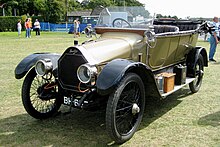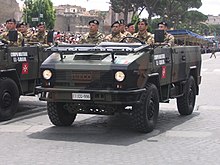トーピード (自動車)
トーピード(英: torpedo)型は、1908年から1930年代中頃まで使用された自動車の車体形状の一類型である。流線形の断面と、折りたたみ式または取り外し可能なソフトトップを有していた。"Torpedo" は英語で魚雷の意味。トーピード形状は、ボンネットのラインが車のウエストラインと同じ高さになるように持ち上げられ、その結果、前から後ろまで直線的なベルトラインになっている[1]。



1908年、フランスのグレゴワール車を輸入していたロンドンのセオ・マスイが流線型のボディをデザインし、「Torpedo」と名付けたのが始まりである[2]。
トーピードのボディスタイルは、通常、4人または5人乗りのツーリングカー(固定ルーフのない車)に装着され、取り外し可能または折りたたみ式のルーフ(屋根)、低いサイドパネルとドアを備えていた。Bピラーはなく、フロントガラスを支える垂直材のみが存在していた。
出典
編集- ^ Roberts, Peter (1974). “Carriage to Car”. Veteran and Vintage Cars. London, UK: Octopus Books. p. 111. ISBN 0-7064-0331-2. "Torpedo – Continental term for an open four-seat car with soft hood and sporting tendencies and in which the line of the bonnet was continued back to the rear of the car."
- ^ Wood, Jonathan (2008). Coachbuilding – The Hand Crafted Car Body. Oxford, UK: Shire Publications. ISBN 978-0-7478-0688-2
- ^ “Antique, Vintage and Classic Car Terms and Definitions”. antiquecar.com. 2008年1月23日閲覧。
- ^ Brunninge, Olof (2007). “1, Scania's bonneted trucks”. In Lerpold, Lin; Ravasi, Davide; van Rekom, Johan et al.. Organizational Identity in Practice. Abingdon, Oxford, UK: Routledge. p. 24. ISBN 978-0-415-39839-8. "When cabs were modularized in the 2-series in 1980, the first version to be launched was the bonneted cab, the so-called T-cab, with a torpedo-like design."
- ^ Peck, Colin (2010). “The 1950s – new factories, new trucks and buses”. DAF Trucks Since 1949. Poundbury, Dorset, UK: Veloce Publishing. p. 19. ISBN 978-1-845842-60-4. "To meet the more conservative demands of specific sectors of the market, DAF introduced its first bonneted truck in 1957, with mechanical specifications similar to the cab-over-engine models. Generically known as the 'Torpedo' series, these new trucks were initially supplied as a chassis and bonnet, allowing coachbuilders to construct the cabs."